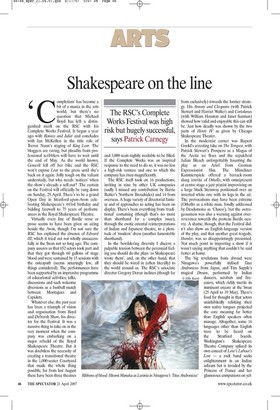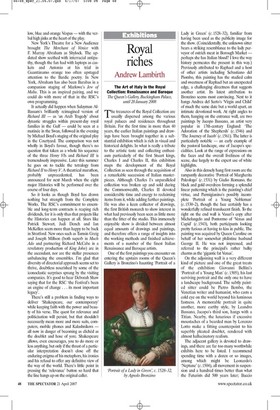Shakespeare on the line
The RSC’s Complete Works Festival was high risk but hugely successful, says Patrick Carnegy ‘C ompletism’ has become a bit of a mania in the arts world, but there’s no question that Michael Boyd has left a distinguished mark on the RSC with his Complete Works Festival. It began a year ago with Romeo and Juliet and concludes with Ian McKellen in the title role of Trevor Nunn’s staging of King Lear. The bloggers are raving, but plaudits from professional scribblers will have to wait until the end of May. As the world knows, Goneril fell off her bike and the RSC won’t expose Lear to the press until she’s back on it again. Jolly tough on the valiant understudy, but who needs ‘notices’ when the show’s already a sell-out? The curtain on the Festival will officially be rung down on Sunday, 29 April. There’s to be a grand Open Day in Stratford-upon-Avon celebrating Shakespeare’s 443rd birthday and bidding farewell to 75 years of performances in the Royal Shakespeare Theatre.
Virtually every line of Bardic verse or prose seems to have been given an airing beside the Avon, though I’m not sure the RSC has explained the absence of Edward III, which it tried out not wholly unsuccessfully in the Swan not so long ago. The company assures us that 652 actors took part and that they got through 60 gallons of stage blood and were sustained by 15 sessions with the osteopath (seems amazingly few, all things considered). The performances have been supported by an impressive programme of educational activities, talks, discussions and such welcome diversions as a football match between Montagues and Capulets.
Whatever else, the past year has been a triumph of vision and organisation from Boyd and Deborah Shaw, his director for the Festival. It was a massive thing to take on at the very moment when the company was embarking on a major rebuild of the Royal Shakespeare Theatre. But it was doubtless the necessity of creating a transitional theatre in the 1,000-seater Courtyard that made the whole thing possible, for from last August there have been three theatres and 3,000 seats nightly available to be filled. If the Complete Works was an inspired response to the need to do so, it was no less a high-risk venture and one to which the company has risen magnificently.
The RSC itself took on 16 productions, inviting in nine by other UK companies (sadly I missed any contribution by Barrie Rutter’s Northern Broadsides) and 14 from overseas. A huge variety of directorial fantasy and of approaches to acting has been on display. There’s been everything from ‘traditional’ costuming (though that’s no more than shorthand for a complex issue), through the exotic oriental reinterpretations of Indian and Japanese theatre, to a plenitude of ‘modern’ dress (another lamentable shorthand).
In the bewildering diversity I discern a palpable tension between the perennial feeling you should do the plays ‘as Shakespeare wrote them’, and, on the other hand, that they should be wired in (often literally) to the world around us. The RSC’s associate director Gregory Doran inclines (though far from exclusively) towards the former strategy. His Antony and Cleopatra (with Patrick Stewart and Harriet Walter) and Coriolanus (with William Houston and Janet Suzman) showed how valid and enjoyable this can still be. Just how deadly was shown by the two parts of Henry IV as given by Chicago Shakespeare Theater.
In the modernist corner was Rupert Goold’s arresting take on The Tempest, with Patrick Stewart’s Prospero as a Magus of the Arctic ice floes and the sepulchral Julian Bleach unforgettably haunting the play as an Ariel from German Expressionist film. The Münchner Kammerspiele offered a barrack-room slang rewrite of Othello, with omnipresent at centre stage a jazz pianist improvising on a large black Steinway positioned over an inverted white one with its legs in the air. The provocations may have been extreme (Othello as a white man, fondly addressed by Desdemona as ‘Choco’), but the outrageousness was also a warning against overreverence towards the protean Bardic oeuvre. A shame, though, that the Festival didn’t also show an English-language version of the play, and that another great tragedy, Hamlet, was so disappointingly presented. Not much point in importing a show if it wasn’t saying anything that couldn’t be said better at home.
The big revelations from abroad were Ninagawa’s powerfully stylised Titus Andronicus from Japan, and Tim Supple’s magical Dream, performed by Indian dancers, acrobats and fireeaters, which richly merits its imminent encore at the Swan (25 April to 19 May). There’s food for thought in that actors uninhibitedly relishing their own native tongues projected the core meaning far better than English speakers often manage. Altogether, some 16 languages other than English were to be heard on
© Ellie Kurttz
the Stratford boards. Washington’s Shakespeare Theatre Company spliced its own conceit of Love’s Labour’s Lost — a rock band seeks enlightenment in an Indian ashram but is invaded by the Princess of France and her glamorous companions on yel low, blue and orange Vespas — with the verbal high jinks at the heart of the play.
New York’s Theatre for a New Audience brought The Merchant of Venice with F. Murray Abraham as Shylock. The updated show seethed with interracial antipathy, though the fun had with laptops as caskets and Antonio at his trial in Guantánamo orange too often upstaged attention to the Bardic poetry. In New York, Abraham has also been Barabas in a companion staging of Marlowe’s Jew of Malta. This is an inspired pairing, and we could do with more of that in the RSC’s own programming.
It actually did happen when Sulayman AlBassam’s brilliantly reimagined version of Richard III — as ‘an Arab Tragedy’ about dynastic struggles within present-day royal families in the Gulf — could be seen at a matinée in the Swan, followed in the evening by Michael Boyd’s staging of the original play in the Courtyard. The comparison was not wholly in Boyd’s favour, though there’s no question that taken as a whole his sequence of the three Henry VIs and Richard III is tremendously impressive. Later this summer he goes on to tackle the tetralogy from Richard II to Henry V. A theatrical marathon, probably unprecedented, has been announced for next March when the eight major Histories will be performed over the course of four days.
So it looks as though Boyd has drawn nothing but strength from the Complete Works. The RSC’s commitment to ensemble and long-term contracts is reaping rich dividends, for it is only thus that projects like the Histories can happen at all. Stars like Patrick Stewart, Judi Dench and Ian McKellen seem more than happy to be back in Stratford. New ones such as Tamsin Greig and Joseph Millson (both superb in Much Ado and partnering Richard McCabe in a revelatory production of King John) are in the ascendant, nor are the stellar presences unbalancing the ensembles. I’m glad that diversity of directorial approach seems set to thrive, doubtless nourished by some of the iconoclastic surprises sprung by the visiting companies. It’s good to hear Deborah Shaw saying that for the RSC ‘the Festival’s been an engine of change ... its most important legacy’.
There’s still a problem in finding ways to deliver ‘Shakespeare, our contemporary’ while keeping faith with the power and beauty of his verse. The quest for relevance and politicisation will persist, but that shouldn’t necessarily mean more and more suits, computers, mobile phones and Kalashnikovs all now in danger of becoming as clichéd as the doublet and hose of yore. Shakespeare allows, even encourages, you to do more or less anything, but only if the thrust of a particular interpretation doesn’t close off the enduring enigma of his metaphors, his ironies and his refusal to offer any definitive view of the way of the world. There’s little point in pressing the ‘relevance’ button so hard that the line hangs up on the original caller.



















































































 Previous page
Previous page